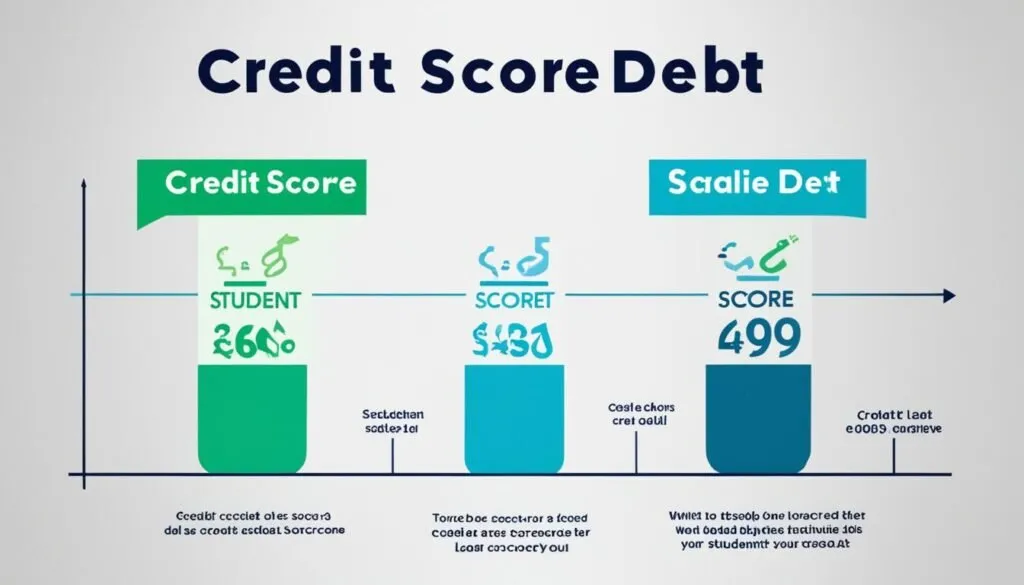When it comes to financing higher education, many college students turn to student loans to cover their tuition and other expenses. While the idea of taking on debt may seem daunting, student loans actually offer several benefits that can make them a wise investment for aspiring graduates.
One significant advantage is the availability of the student loan forgiveness program. This program allows borrowers to have their loans forgiven after a certain number of years of repayment, particularly for those working in qualifying public service jobs.
Another benefit is the ability to manage student loan debt effectively. Federal student loans offer flexible repayment options such as income-driven repayment plans, which allow borrowers to make payments based on their income and family size. This ensures that loan payments remain within a manageable range.
Additionally, student loan interest deduction is another advantage to consider. Borrowers may be eligible to deduct the interest paid on their student loans from their taxable income, potentially saving them money on their tax bills.
Overall, managing student loan debt responsibly can lead to a positive impact on credit scores and credit history, as timely repayments can demonstrate financial responsibility to lenders. This, in turn, opens up opportunities for future loans and financial benefits.
Key Takeaways:
- The student loan forgiveness program offers the possibility of having loans forgiven after a certain number of years.
- Flexible repayment options, such as income-driven repayment plans, make managing student loan debt easier.
- Student loan interest deduction allows borrowers to deduct the interest paid on their loans from their taxable income.
- Student loan debt can have a positive impact on credit scores when managed responsibly.
- Responsible management of student loan debt can lead to future financial benefits and opportunities.
Access to Education
One of the main benefits of student loan debt is the access it provides to higher education. Federal student loans are available to students who complete the Free Application for Federal Student Aid (FAFSA). These loans can help cover the costs of tuition, books, and other educational expenses. They serve as a financial aid option for students who may not have the means to pay for college out of pocket.
With the rising cost of education, many individuals find it challenging to afford the expenses associated with pursuing a degree. Scholarships and grants may not always be sufficient to cover the full cost, leaving a gap in funding. Federal student loans bridge this gap and provide students with the opportunity to pursue their educational goals.
Access to education is a crucial aspect of personal and professional development. By offering federal student loans, the government enables students from various socioeconomic backgrounds to access the education they desire, shaping a more inclusive and diverse society.
Through federal loan programs, students can access the financial aid they need to enroll in colleges and universities. These loans offer competitive interest rates and flexible repayment options, making education more affordable in the long run. By investing in their education through federal student loans, individuals can unlock opportunities for personal and career growth.
Benefits of Federal Student Loans
When considering student loan options, federal loans are often favored due to their numerous advantages. These include:
- Lower interest rates compared to private loans
- Flexible repayment plans based on income
- Possibility of loan forgiveness programs
- Access to other federal student aid programs
The accessibility of federal student loans empowers students to pursue higher education without being burdened by the immediate financial obligations. By providing a reliable source of funding, these loans contribute to the democratization of education and promote equal opportunities for all.
| Advantages of Federal Student Loans | Example |
|---|---|
| Lower interest rates compared to private loans | 5% fixed interest rate on federal student loans versus 8% variable interest rate on private loans. |
| Flexible repayment options | Income-driven repayment plans that adjust monthly payments based on income and family size. |
| Possibility of loan forgiveness programs | Public Service Loan Forgiveness program for eligible borrowers working in public service jobs. |
| Access to other federal student aid programs | Eligibility for grants, work-study programs, and other forms of financial assistance. |
The image above highlights the role of federal student loans in providing access to education for students from diverse backgrounds.
Credit Building

When it comes to student loan debt, there is a silver lining amidst the financial responsibility. Did you know that student loans can actually help students build their credit? By consistently making timely repayments on their loans, students can establish a positive credit history and improve their credit score.
Building credit through student loan payments is valuable for a number of reasons. Your credit score is an important factor when it comes to applying for other types of loans, such as car loans or mortgages, in the future. A good credit score demonstrates your financial responsibility to potential lenders, increasing your chances of approval and securing better interest rates.
By responsibly managing your student loan debt and making regular payments, you can steadily build your credit history. This demonstrates to lenders that you are a trustworthy borrower who can handle financial obligations effectively. Remember, establishing a solid credit history takes time and discipline, but the payoff is worth it.
Responsible management of student loan debt provides students with an opportunity to establish a positive credit history and improve their credit score. This can open doors to future financial opportunities and set them on the path to a secure financial future.
It’s important to note that late or missed payments can have a negative impact on your credit score. So, make sure to budget effectively and set up automatic payments to avoid any potential setbacks. Keeping your credit utilization low and paying off your student loans on time can help you maintain a healthy credit score.
Remember, your credit score is an essential financial tool that can affect various aspects of your life. Building credit through responsible student loan payments is a step towards achieving financial stability and unlocking future opportunities.
Benefits of Credit Building through Student Loans:
- Establish a positive credit history
- Improve your credit score
- Increase chances of loan approval
- Secure better interest rates
- Open doors to future financial opportunities
Now that you understand the importance of credit building, let’s explore the range of flexible repayment options available for student loans in the next section.
Flexible Repayment Options

When it comes to repaying your federal student loans, flexibility is key. The U.S. Department of Education offers a range of repayment options designed to suit different financial situations and income levels. These flexible repayment options can help borrowers manage their loan payments more effectively and make the process more manageable.
Income-Driven Repayment Plans
One of the most popular flexible repayment options is income-driven repayment (IDR) plans. These plans allow borrowers to make loan payments based on their income and family size, ensuring that the payments are affordable and tied to their financial circumstances.
There are several types of IDR plans available, including:
- Income-Based Repayment (IBR) Plan
- Pay As You Earn (PAYE) Plan
- Revised Pay As You Earn (REPAYE) Plan
- Income-Contingent Repayment (ICR) Plan
Under these plans, the monthly loan payments are set at a percentage of the borrower’s discretionary income, which is typically calculated as a certain percentage of their adjusted gross income minus 150% of the federal poverty guideline for their family size and state of residence.
These income-driven repayment plans provide borrowers with the flexibility to adjust their monthly payments as their income changes over time. This can be especially beneficial for individuals who have lower incomes or who are facing economic hardships.
Loan Forgiveness Programs
In addition to flexible repayment options, there are also loan forgiveness programs available for borrowers with federal student loans. These programs offer the opportunity for borrowers to have a portion or the remaining balance of their loans forgiven under certain conditions.
One such program is the Public Service Loan Forgiveness (PSLF) program. This program forgives the remaining balance on qualifying loans for borrowers who work full-time for a qualifying employer in a public service job and make 120 qualifying monthly loan payments.
Another loan forgiveness program is the Teacher Loan Forgiveness program, which is specifically designed for teachers who work in low-income schools or educational service agencies. Eligible teachers may qualify for up to $17,500 in loan forgiveness after completing five consecutive years of teaching service.
Repayment Plans Overview
To help you better understand the different repayment options available, check out this comprehensive table below:
| Repayment Plan | Eligible Loans | Monthly Payment | Payment Duration | Eligibility for Forgiveness |
|---|---|---|---|---|
| Standard Repayment Plan | All Direct Loans | Fixed | Up to 10 years | No |
| Graduated Repayment Plan | All Direct Loans | Lower initially, then increases every two years | Up to 10 years | No |
| Extended Repayment Plan | All Direct Loans | Fixed or graduated | Up to 25 years | No |
| Income-Based Repayment Plan (IBR) | All Direct Loans | 10-15% or 10% of discretionary income | 20-25 years | Yes |
| Pay As You Earn (PAYE) | Direct Subsidized and Unsubsidized Loans, Direct Grad PLUS Loans made to graduate or professional students | 10% of discretionary income | 20 years | Yes |
| Revised Pay As You Earn (REPAYE) | All Direct Loans | 10% of discretionary income | 20-25 years | Yes |
| Income-Contingent Repayment (ICR) | All Direct Loans | 20% of discretionary income or fixed payment over 12 years | 25 years | Yes |
These flexible repayment options and loan forgiveness programs provide borrowers with the opportunity to make their student loan payments more manageable and, in some cases, have a portion of their loans forgiven. It is essential for borrowers to explore the different options available to determine which repayment plan best suits their financial circumstances and long-term goals.
Credit Score Impact

When it comes to student loans, the impact on credit scores is a common concern for borrowers. However, if managed responsibly, student loans can actually have a positive effect on credit scores and creditworthiness.
One of the key factors in determining a credit score is the borrower’s credit history. By taking out and repaying student loans on time, borrowers can establish a solid credit history. This demonstrates to lenders that they are responsible and capable of managing debt effectively.
Making regular, on-time loan payments is crucial for maintaining a good credit history and improving credit scores. Each payment made contributes to a positive credit record and shows that the borrower is fulfilling their financial obligations.
Student loans also provide an opportunity for borrowers to diversify their credit mix. Having different types of credit, such as student loans, credit cards, and installment loans, can actually boost a credit score. Lenders view a diverse credit mix as a sign of financial responsibility and may be more willing to extend credit in the future.
It is important for borrowers to be diligent in their loan repayments to ensure a positive impact on their creditworthiness. Missed or late payments can have a detrimental effect on credit scores, potentially leading to a lower credit score and difficulty obtaining other types of credit in the future.
Overall, responsible management of student loans can contribute to a good credit history and improve credit scores. By consistently making on-time payments, borrowers can establish themselves as reliable borrowers and increase their chances of obtaining future credit at favorable terms.
“Student loans can help borrowers build a positive credit history and improve credit scores when managed responsibly.”